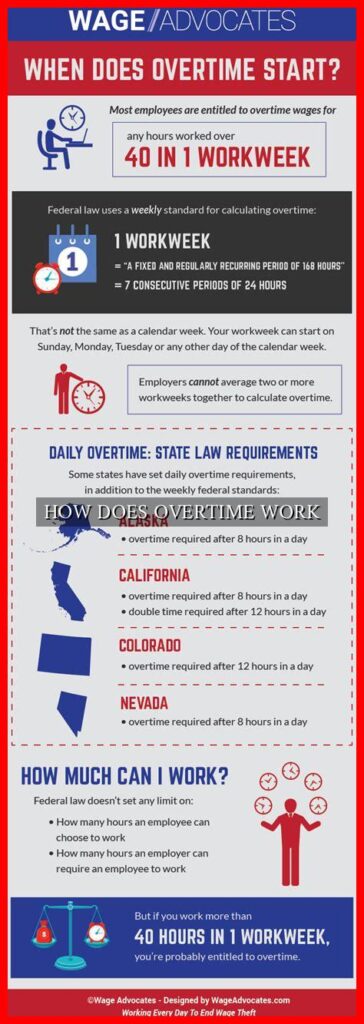-
Table of Contents
How Does Overtime Work
Overtime is a common practice in many workplaces, where employees work additional hours beyond their regular schedule. Understanding how overtime works is essential for both employers and employees to ensure compliance with labor laws and fair compensation for extra work. In this article, we will delve into the intricacies of overtime, including its definition, calculation, regulations, and benefits.
Definition of Overtime
Overtime refers to the extra hours worked by an employee beyond their standard workweek or workday. In most countries, including the United States, overtime is typically defined as any hours worked beyond 40 hours in a workweek. However, some states and industries may have different regulations regarding overtime thresholds.
Calculation of Overtime
The calculation of overtime pay is usually based on the employee’s regular rate of pay.
. In the United States, the Fair Labor Standards Act (FLSA) mandates that non-exempt employees must be paid at least one and a half times their regular rate of pay for any hours worked over 40 in a workweek. For example, if an employee’s regular rate of pay is $15 per hour, their overtime rate would be $22.50 per hour.
- Regular Rate of Pay: $15 per hour
- Overtime Rate: $22.50 per hour
Regulations on Overtime
Employers are required to comply with labor laws and regulations regarding overtime pay to avoid legal repercussions. Failure to pay overtime correctly can result in penalties, fines, and lawsuits. It is crucial for employers to understand the specific overtime regulations in their jurisdiction and industry to ensure compliance.
For example, in California, employees are entitled to overtime pay for any hours worked beyond 8 hours in a workday or 40 hours in a workweek. Additionally, some industries, such as healthcare and transportation, have specific regulations governing overtime pay due to the nature of their work.
Benefits of Overtime
While overtime work can be demanding and tiring, it also comes with several benefits for employees. Overtime pay provides an opportunity for employees to earn extra income and increase their overall compensation. Additionally, some employers offer incentives such as double-time pay for holidays or weekends to encourage employees to work extra hours when needed.
Moreover, overtime work can also lead to career advancement opportunities and recognition for employees who demonstrate dedication and commitment to their work. By taking on additional responsibilities and working extra hours, employees can showcase their skills and work ethic, which may lead to promotions or salary increases in the future.
Summary
In conclusion, understanding how overtime works is essential for both employers and employees to ensure fair compensation and compliance with labor laws. Overtime pay is calculated based on the employee’s regular rate of pay, with non-exempt employees entitled to one and a half times their regular rate for any hours worked over 40 in a workweek. Employers must adhere to specific regulations on overtime pay to avoid legal consequences, and employees can benefit from overtime work through increased income, career advancement opportunities, and recognition for their hard work.
For more information on overtime regulations and best practices, you can visit the U.S. Department of Labor website.


